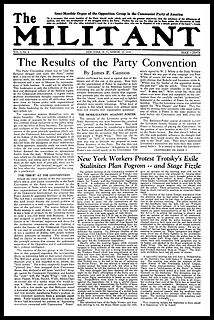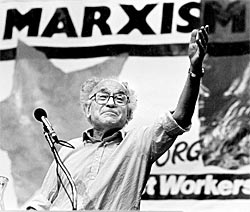
The Fourth International (FI) is a revolutionary socialist international organization consisting of followers of Leon Trotsky, also known as Trotskyists, whose declared goal is the overthrowing of global capitalism and the establishment of world socialism via international revolution. The Fourth International was established in France in 1938, as Trotsky and his supporters, having been expelled from the Soviet Union, considered the Third International or Comintern as effectively puppets of Stalinism and thus incapable of leading the international working class to political power. Thus, Trotskyists founded their own competing Fourth International.

Shachtmanism is the form of Marxism associated with Max Shachtman (1904–1972). It has two major components: a bureaucratic collectivist analysis of the Soviet Union and a third camp approach to world politics. Shachtmanites believe that the Stalinist rulers of proclaimed socialist countries are a new ruling class distinct from the workers and reject Trotsky's description of Stalinist Russia as a "degenerated workers' state".
Max Shachtman was an American Marxist theorist. He went from being an associate of Leon Trotsky to a social democrat and mentor of senior assistants to AFL-CIO President George Meany.

Socialist Appeal is the newspaper of the British section of the International Marxist Tendency, and also the name used by a group of members and supporters of the Labour Party who organise around the paper.
Alan Thornett is a British Trotskyist.
The Workers Socialist League (WSL) was a Trotskyist group in Britain. The group was formed by Alan Thornett and other members of the Workers Revolutionary Party (WRP) after their expulsion from that group in 1974.
James Robertson (1928–2019) was the long-time and founding National Chairman of the Spartacist League (US), the original national section of the International Communist League. In his later years, Robertson was consultative member of the ICL's international executive committee.
The League for a Workers' Republic (LWR) was a Trotskyist organisation in Ireland.
Albert Glotzer (1908–1999), also known as Albert Gates, was a professional stenographer and founder of the Trotskyist movement in the United States. He was best remembered as the court reporter for the 1937 John Dewey Commission that examined the Stalinist charges against Trotsky in Mexico City and as a memoirist and activist in the social democratic movement in his later years.
The Workers Party (WP) was a Third Camp Trotskyist group in the United States. It was founded in April 1940 by members of the Socialist Workers Party who opposed the Soviet invasion of Finland and Leon Trotsky's belief that the USSR under Joseph Stalin was still innately proletarian, a "degenerated workers' state." They included Max Shachtman, who became the new group's leader, Hal Draper, C. L. R. James, Raya Dunayevskaya, Martin Abern, Joseph Carter, Julius Jacobson, Phyllis Jacobson, Albert Glotzer, Stan Weir, B. J. Widick, James Robertson, and Irving Howe. The party's politics are often referred to as "Shachtmanite."
The third camp, also known as third camp socialism or third camp Trotskyism, is a branch of socialism that aims to oppose both capitalism and Stalinism by supporting the organised working class as a "third camp".

The Socialist Party is a Trotskyist political party in England and Wales. Founded in 1997, it had formerly been Militant, an entryist group in the Labour Party from 1964 to 1991, which became Militant Labour from 1991 until 1997.

The Communist League of America (Opposition) was founded by James P. Cannon, Max Shachtman and Martin Abern late in 1928 after their expulsion from the Communist Party USA for Trotskyism. The CLA(O) was the United States section of Leon Trotsky's International Left Opposition and initially positioned itself as not a rival party to the CPUSA but as a faction of it and the Comintern. The group was terminated in 1934 when it merged with the American Workers Party headed by A. J. Muste to establish the Workers Party of the United States.

James Patrick Cannon was an American Trotskyist and a leader of the Socialist Workers Party.
The Alliance for Workers' Liberty (AWL), also known as Workers' Liberty, is a Trotskyist group in Britain and Australia, which has been identified with the theorist Sean Matgamna throughout its history. It publishes the newspaper Solidarity.

Tony Cliff was a Trotskyist activist. Born to a Jewish family in Palestine, he moved to Britain in 1947 and by the end of the 1950s had assumed the pen name of Tony Cliff. A founding member of the Socialist Review Group, which became the International Socialists and then the Socialist Workers Party. In 1977, Cliff was effectively the leader of all three.
The Revolutionary Communist Party was a British Trotskyist group, formed in 1944 and active until 1949, which published the newspaper Socialist Appeal and a theoretical journal, Workers International News.
The Socialist Workers Party (SWP) is a communist party in the United States. Originally a group in the Communist Party USA that supported Leon Trotsky against Soviet leader Joseph Stalin, it places a priority on "solidarity work" to aid strikes and is strongly supportive of Cuba. The SWP publishes The Militant, a weekly newspaper that dates back to 1928. It also maintains Pathfinder Press.

Edward Grant was a South African Trotskyist who spent most of his adult life in Britain. He was a founding member of the group Militant and later Socialist Appeal.
Orthodox Trotskyism is a branch of Trotskyism which aims to adhere more closely to the philosophy, methods and positions of Leon Trotsky and the early Fourth International, Vladimir Lenin and Karl Marx than other Trotskyists.








